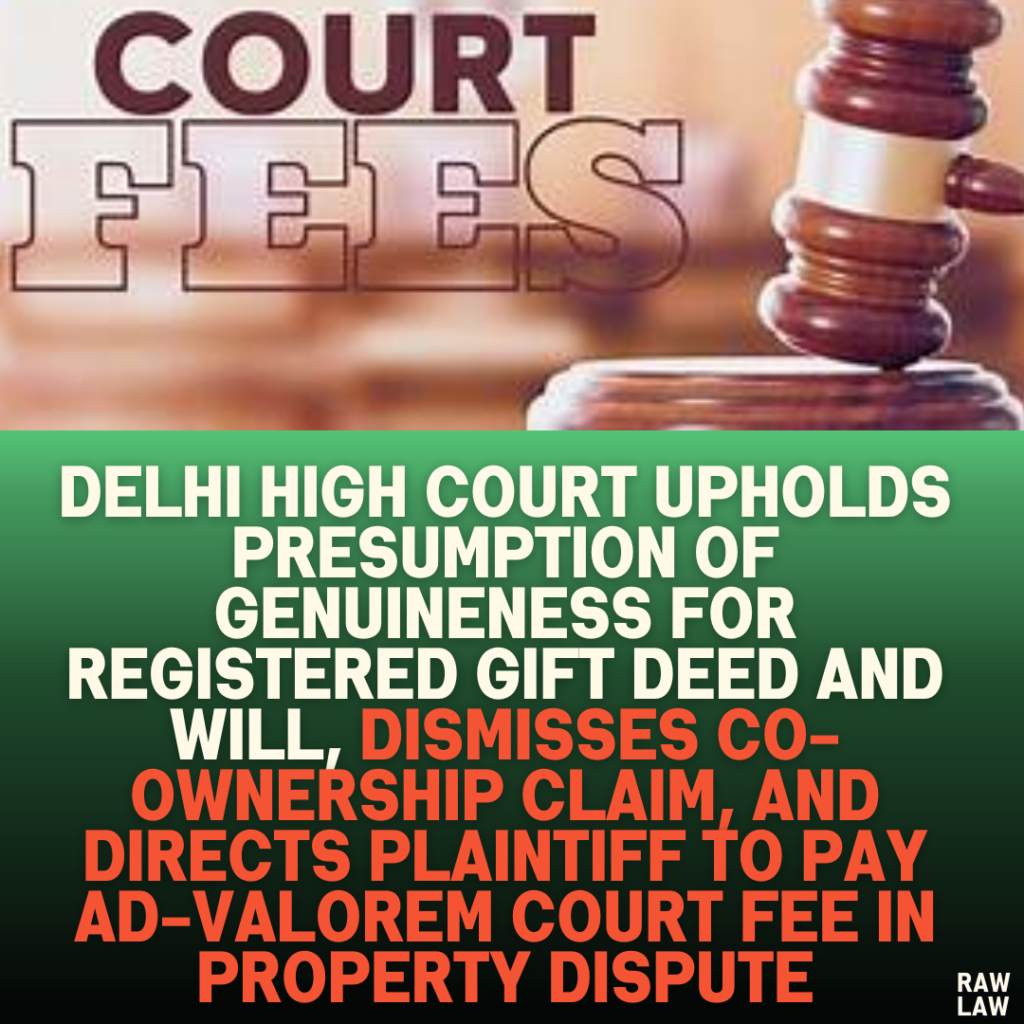Court’s Decision:
The Delhi High Court dismissed the plaintiff’s claims of undue influence and coercion in the execution of a registered Gift Deed and Will concerning a disputed property. The court emphasized that the plaintiff failed to establish a prima facie case of co-ownership and upheld the presumption of the genuineness of registered documents, directing the plaintiff to pay ad-valorem court fees. It allowed the defendant to occupy or let out the property but restrained any sale without prior court permission.
Facts:
The plaintiff sought to declare a registered Gift Deed (dated 03.09.2021) and a Will (dated 24.07.2017) null and void, claiming they were executed under undue influence by the defendant. The suit property was originally owned by the plaintiff’s father, Chander Bhan, who allegedly transferred it under coercion. The plaintiff argued that he and his siblings contributed financially to the property’s purchase and construction. Upon Chander Bhan’s passing in early 2023, the dispute escalated, with claims over the legitimacy of the transfer to the defendant.
Issues:
- Whether the Gift Deed and Will were executed under undue influence.
- Whether the plaintiff could claim co-ownership of the property based on alleged financial contributions.
- Whether the plaintiff is liable to pay ad-valorem court fees for the suit property valued at INR 3 crores.
Petitioner’s Arguments:
The plaintiff argued that the Gift Deed and Will were obtained through undue influence and that he should be recognized as a co-owner due to his financial contributions. He contended that he only became aware of the Gift Deed’s existence in early 2023, just before Chander Bhan’s death, and alleged coercion by the defendant.
Respondent’s Arguments:
The defendant countered that the Gift Deed and Will were validly executed and registered, adding that Chander Bhan had sufficient income to independently acquire and develop the property. The defendant maintained that he had sole possession and sought to modify the status quo order to allow for the property’s occupancy or leasing, offering not to sell it without court approval.
Analysis of the Law:
The court reiterated that registered documents are presumed genuine and valid, referencing the Supreme Court ruling in Prem Singh & Ors. v. Birbal (2006), which established that the burden of proof lies on the party challenging such documents. Additionally, it underscored that financial contributions, even if true, do not automatically confer co-ownership rights under law.
Precedent Analysis:
The court referred to Prem Singh & Ors. v. Birbal, which asserts the presumption of validity for registered documents, placing the onus on the challenger to disprove their legitimacy. Furthermore, it applied the precedent set in Suhrid Singh v. Randhir Singh & Ors., highlighting the necessity for a non-executant challenging a transfer to pay ad-valorem court fees.
Court’s Reasoning:
The court found the plaintiff’s claims of undue influence to be unconvincing, particularly given his failure to share these concerns with his siblings or raise them in earlier proceedings. It noted inconsistencies in the plaintiff’s position regarding possession and financial contributions, rejecting these claims as baseless. The court concluded that the registered Gift Deed and Will were prima facie valid, and it was implausible that the plaintiff only discovered the alleged coercion recently.
Conclusion:
The court held that the plaintiff must pay ad-valorem court fees, as he was not an executant of the Gift Deed and sought declaratory relief. It dismissed the plaintiff’s claim of co-ownership and modified the status quo order to allow the defendant to lease or occupy the property, with a restriction on its sale or mortgage without court notice.
Implications:
This decision reinforces the presumption of validity for registered documents in property disputes, underscoring the importance of providing substantial proof when alleging undue influence. It also clarifies the court’s stance on co-ownership claims based solely on financial contributions without legal ownership rights, guiding future litigants on the burden of proving claims in similar cases.



